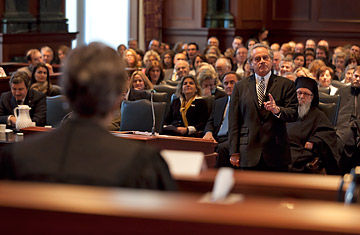
The Onassis Foundation presents The Trial of Socrates at the Daniel Patrick Moynihan Courthouse in New York, May 12, 2011.
(2 of 2)
6:21 p.m. Judge Jacobs picks at Bogdanos' argument with a quip: "You assume that students who are taught eventually learn." Did Socrates' seditious students learn to rebel from him? Or were they rebelling against his teachings? Bogdanos: "The man who holds the ladder is just as guilty as the thief." Laughter all around. The prosecution goes out on a high note.
6:28 p.m. The defense team takes the floor, headed off by criminal defense attorney Eddie Hayes, who pronounces ancient names such as Meletus and Alcibiades with a thick Queens accent. Why would they indict Socrates, Hayes asks? "I think it's for having a big mouth! ... If they want to kill him for having a big mouth, what about my brother too?" He says we shouldn't stop anyone from speaking, because we then stop even more people from listening. A timeless lesson.
6:35 p.m. Hayes makes it clear he doesn't care much for Socrates, but he's doing his damndest to keep him from drinking the hemlock. In fact, his insults turn to vanity: "It looks like they took a stone chisel to his face!" But Hayes argues that despite the philosopher's arrogance, what Socrates preaches about the glory of virtue and building a community could help rescue Athens from its constant overthrows. Maybe Athens' heyday will come from actually listening to Socrates?
6:46 p.m. Fortuitously, we can indeed listen to Socrates, as he is channeled by Benjamin Brafman, the attorney who successfully defended Sean Combs against gun and bribery charges stemming from a nightclub melée in 1999. As there was no written record of what Socrates said, Brafman is taking some creative license as he proclaims Socrates' harmlessness. In advising hundreds of students over 50 years, Socrates claims, only two have turned rogue. Brafman's larger-than-life rendition has the gallery in stitches. "I'm a 70-year-old man walking in a sheet, naked," he says. "I'm not a threat!"
7:00 p.m. Socrates/Brafman appeals directly to us, trying to guilt us into letting him go free. "How would you feel if you put me to death?" He's running a few minutes over his allotted time, but no one seems to mind, even the judges — who've been sticklers for the clock up to this point.
7:04 p.m. Chief Judge Preska takes the opportunity to slam Socrates in the flesh, equating his pompousness in the courtroom with the impiety charge levied against him. She has a point: he who loves himself the most likely holds no God. With that, the judges are off to deliberate.
7:32 p.m. The judges emerge from their chamber and Chief Judge Jacobs hands down their decision to acquit on both charges: "The prosecution didn't prove that Socrates' personal God was not a not-approved God." Chief Judge Carol Amon dissented, calling Socrates a "dangerous subversive." But Chief Judge Preska felt that, as Socrates reflected no "clear and present danger," and his impiety seemed more a factor of disinterest than disrespect, the court could not find him guilty.
While the charges levied against the philosopher may not stand in a current court of law, did the trial truly exonerate Socrates? Does the circumstantial evidence still cast a shadow over his historical memory? If Socrates had shared an attorney with P. Diddy, would he have had to drink the hemlock? In the words of Socrates himself: "All I know is that I know nothing."
